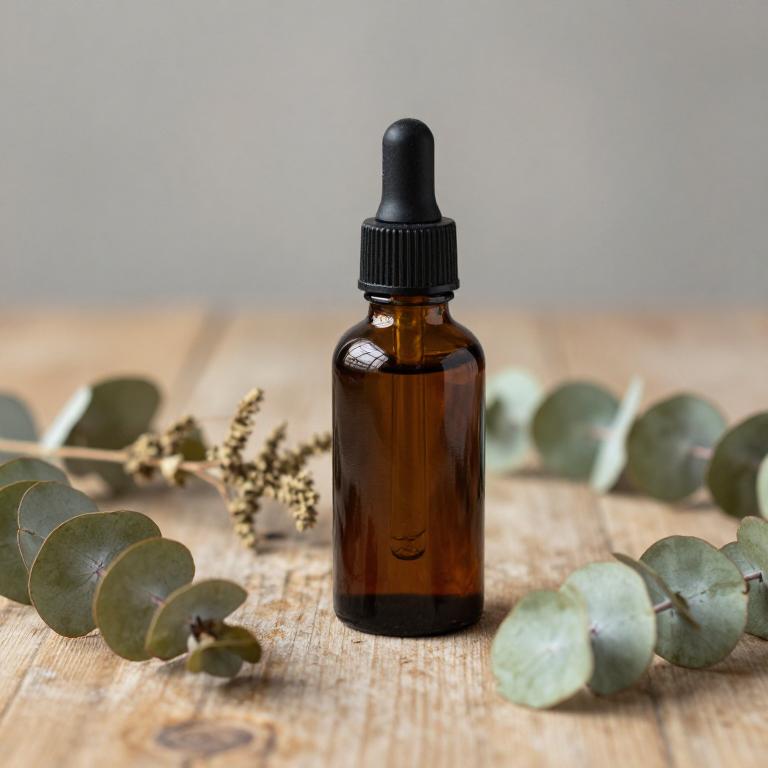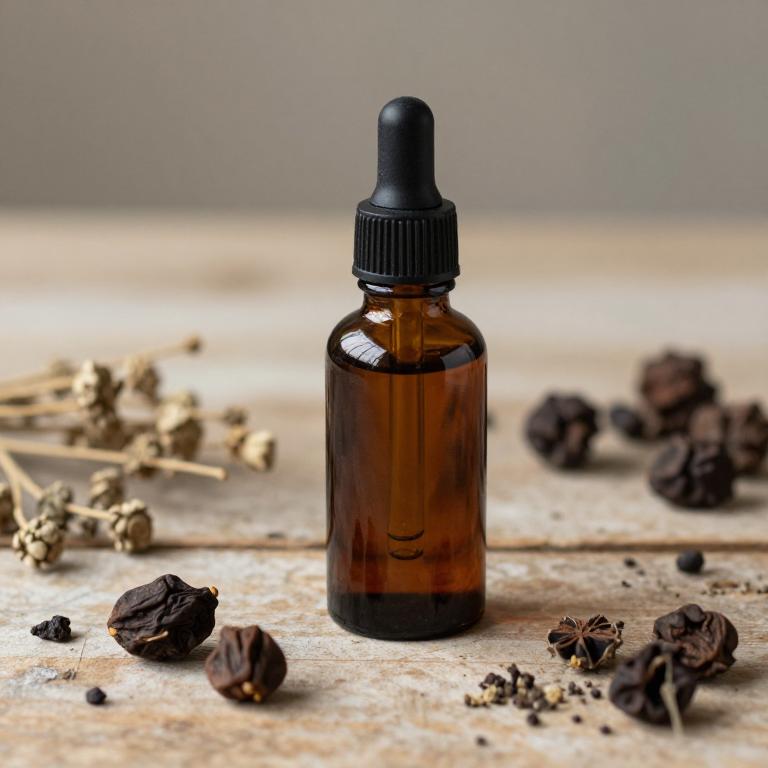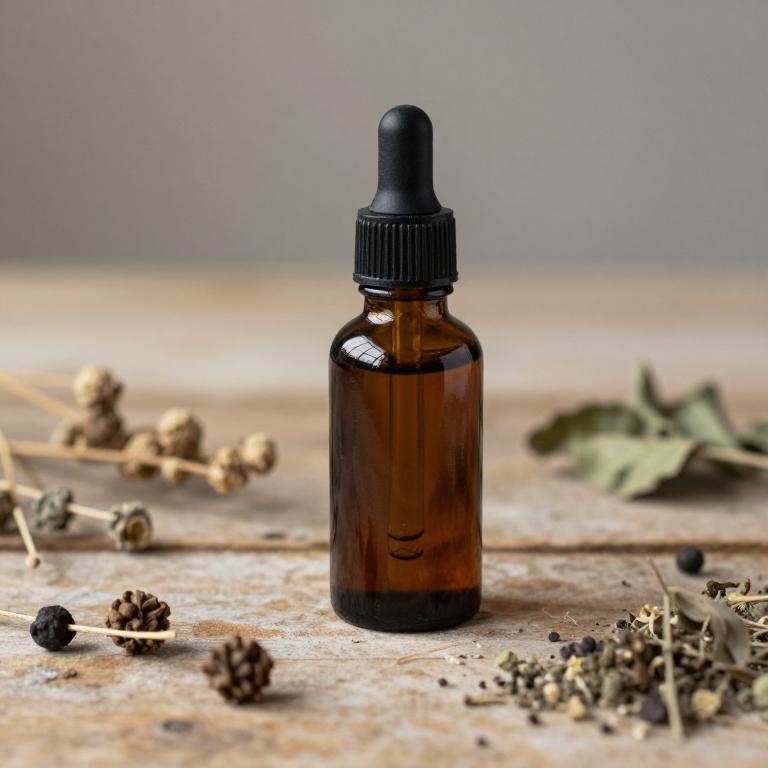10 Best Herbal Tinctures For Sinusitis

Herbal tinctures have gained popularity as a natural alternative for managing symptoms of sinusitis, offering a blend of traditional remedies and modern herbal science.
These tinctures typically contain ingredients such as echinacea, garlic, ginger, and eucalyptus, which are known for their anti-inflammatory and antimicrobial properties. They work by supporting the body's natural defenses and reducing congestion, making them a soothing option for those seeking relief without pharmaceuticals. However, it is important to consult a healthcare professional before using herbal tinctures, especially for chronic or severe cases of sinusitis.
While they may provide relief for mild symptoms, they should not replace conventional medical treatment when necessary.
Table of Contents
- 1. Ginger (Zingiber officinale)
- 2. Thyme (Thymus vulgaris)
- 3. Rosemary (Rosmarinus officinalis)
- 4. Eucalyptus (Eucalyptus globulus)
- 5. Echinacea (Echinacea purpurea)
- 6. Licorice (Glycyrrhiza glabra)
- 7. Black pepper (Piper nigrum)
- 8. Yarrow (Achillea millefolium)
- 9. Peppermint (Mentha piperita)
- 10. Ceylon cinnamon (Cinnamomum verum)
1. Ginger (Zingiber officinale)

Zingiber officinale, commonly known as ginger, has been traditionally used for its anti-inflammatory and antimicrobial properties, making it a popular ingredient in herbal tinctures for sinusitis.
These tinctures are often prepared by soaking fresh or dried ginger root in alcohol or glycerin to extract its active compounds, such as gingerol and shogaol. The aromatic compounds in ginger can help reduce nasal congestion and alleviate the inflammation associated with sinus infections. When used as a nasal spray or taken orally, ginger tinctures may help ease symptoms like headaches and post-nasal drip.
However, it is important to consult with a healthcare provider before using ginger tinctures, especially for individuals with allergies or those taking other medications.
2. Thyme (Thymus vulgaris)

Thymus vulgaris, also known as thyme, is a popular herb used in the preparation of tinctures for its potent antimicrobial and anti-inflammatory properties.
These tinctures are often recommended for the treatment of sinusitis due to their ability to help reduce nasal congestion and combat bacterial and viral infections. The essential oils in thyme, particularly thymol, contribute to its effectiveness in clearing mucus and soothing irritated sinus passages. When used as a complementary therapy, thymus vulgaris tinctures may help alleviate symptoms such as headache, facial pressure, and postnasal drip.
However, it is important to consult with a healthcare professional before use, especially for individuals with allergies or those taking other medications.
3. Rosemary (Rosmarinus officinalis)

Rosmarinus officinalis, commonly known as rosemary, is a popular herb used in the preparation of tinctures for the treatment of sinusitis due to its potent anti-inflammatory and antimicrobial properties.
These tinctures are typically made by soaking dried rosemary leaves in alcohol, allowing the active compounds such as rosmarinic acid and cineole to be extracted for therapeutic use. Rosemary tinctures may help reduce nasal congestion and inflammation by promoting mucus drainage and soothing irritated sinus tissues. They are often used as a complementary therapy alongside conventional treatments for chronic or recurrent sinus infections.
However, individuals should consult with a healthcare professional before using rosemary tinctures, especially if they are pregnant, nursing, or taking medications that may interact with herbal supplements.
4. Eucalyptus (Eucalyptus globulus)

Eucalyptus globulus, commonly known as the Australian blue gum, is widely used in herbal tinctures for its potent anti-inflammatory and decongestant properties.
These tinctures are often employed to alleviate symptoms of sinusitis by reducing mucus buildup and easing nasal congestion. The active compounds in eucalyptus, such as cineole and eucalyptol, help to soothe irritated nasal passages and improve breathing. When used as a complementary therapy, eucalyptus globulus tinctures may support natural healing processes in chronic or acute sinus infections.
However, it is important to consult a healthcare professional before using these tinctures, especially for individuals with allergies or those taking other medications.
5. Echinacea (Echinacea purpurea)

Echinacea purpurea herbal tinctures are commonly used to support immune function and may help alleviate symptoms of sinusitis by reducing inflammation and combating viral or bacterial infections.
These tinctures are typically made by soaking the dried roots and flowers of the plant in alcohol, which extracts its active compounds such as alkamides, caffeic acid derivatives, and flavonoids. While some studies suggest echinacea may shorten the duration of colds, its effectiveness for sinusitis specifically remains inconclusive, with more research needed to confirm its benefits. Many people use echinacea tinctures as a natural alternative to conventional treatments, often in combination with other herbs like garlic or zinc.
It is important to consult a healthcare provider before using echinacea, especially for individuals with allergies or those taking medications, to ensure safety and proper dosage.
6. Licorice (Glycyrrhiza glabra)

Glycyrrhiza glabra, commonly known as licorice root, is a traditional herbal remedy that has been used for centuries to support respiratory health.
Its tincture form is often utilized to alleviate symptoms of sinusitis due to its anti-inflammatory and expectorant properties. The active compounds in licorice root, such as glycyrrhizin and flavonoids, help reduce mucus production and soothe irritated nasal passages. When used as a tincture, it may help decrease inflammation in the sinuses and promote easier breathing.
However, it is important to consult with a healthcare professional before using licorice tinctures, especially for prolonged periods, as it may have side effects such as increased blood pressure.
7. Black pepper (Piper nigrum)

Piper nigrum, commonly known as black pepper, has been traditionally used in herbal medicine for its potential anti-inflammatory and antimicrobial properties.
When prepared as a tincture, Piper nigrum may help alleviate symptoms of sinusitis by reducing nasal congestion and fighting off infection. The active compound, piperine, is believed to enhance the absorption of other herbal ingredients and support the body's natural healing processes. While some studies suggest that black pepper tinctures may offer relief for sinus inflammation, more clinical research is needed to confirm their efficacy.
As with any herbal remedy, it is advisable to consult a healthcare professional before use, especially for individuals with chronic sinus conditions or those taking other medications.
8. Yarrow (Achillea millefolium)

Achillea millefolium, commonly known as yarrow, has been traditionally used in herbal medicine for its anti-inflammatory and antimicrobial properties, making it a potential remedy for sinusitis.
When prepared as a tincture, yarrow can help reduce nasal congestion and inflammation of the sinus passages due to its high content of essential oils and flavonoids. Sinusitis sufferers may find relief from symptoms such as headache, facial pressure, and postnasal drip by using yarrow tinctures as part of a holistic treatment plan. However, it is important to consult with a healthcare professional before using yarrow, as it may interact with certain medications or cause allergic reactions in some individuals.
Overall, yarrow tinctures offer a natural alternative for managing sinusitis symptoms, though they should complement rather than replace conventional medical treatments.
9. Peppermint (Mentha piperita)

Mentha piperita, commonly known as peppermint, is often used in herbal tinctures to alleviate symptoms of sinusitis due to its decongestant and anti-inflammatory properties.
The essential oils found in peppermint, particularly menthol, help to reduce nasal congestion and improve mucus drainage, making it a popular natural remedy for sinus issues. When used as a tincture, mentha piperita can be applied topically or taken orally under proper guidance to provide relief from sinus pressure and headache. However, it is important to consult with a healthcare professional before using peppermint tinctures, especially for individuals with asthma or gastrointestinal sensitivities.
Overall, mentha piperita tinctures offer a mild and accessible option for managing the discomfort associated with sinusitis.
10. Ceylon cinnamon (Cinnamomum verum)

Cinnamomum verum, commonly known as true cinnamon, has been traditionally used in herbal medicine for its anti-inflammatory and antimicrobial properties.
When prepared as a tincture, it may help alleviate symptoms of sinusitis by reducing nasal congestion and combating bacterial or viral infections. The essential oils in cinnamon, such as cinnamaldehyde, are believed to have decongestant effects that can ease breathing through the nasal passages. However, it is important to consult a healthcare professional before using cinnamon tinctures, as they may interact with certain medications or cause allergic reactions in some individuals.
While some anecdotal evidence supports its use, more scientific research is needed to fully establish its efficacy for treating sinusitis.